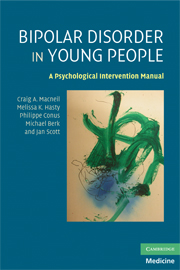Book contents
- Frontmatter
- Contents
- Preface
- Acknowledgements
- Introduction
- 1 Bipolar disorder
- 2 Assessment and engagement
- 3 Insight, adaptation, and functional recovery
- 4 Medication adherence
- 5 Cognitive behavioral therapy interventions
- 6 Social rhythm regulation
- 7 Relationship issues and family work
- 8 Alcohol, substance abuse, and other comorbid disorders
- 9 Identifying early warning signs, preventing relapse, and termination of therapy
- Appendices
- References
- Index
Preface
Published online by Cambridge University Press: 06 July 2010
- Frontmatter
- Contents
- Preface
- Acknowledgements
- Introduction
- 1 Bipolar disorder
- 2 Assessment and engagement
- 3 Insight, adaptation, and functional recovery
- 4 Medication adherence
- 5 Cognitive behavioral therapy interventions
- 6 Social rhythm regulation
- 7 Relationship issues and family work
- 8 Alcohol, substance abuse, and other comorbid disorders
- 9 Identifying early warning signs, preventing relapse, and termination of therapy
- Appendices
- References
- Index
Summary
Bipolar disorder can have a significant effect on adolescent development and has traditionally been associated with poor outcomes, both symptomatically and in terms of psychosocial functioning.
There is growing evidence for the effectiveness of psychological interventions for bipolar disorder, particularly individual and family-based cognitive behavioral therapy (CBT). Furthermore, there is emerging evidence that both psychological and pharmacological interventions may be more effective early in the course of the disorder. However, there is currently very little literature describing the unique challenges and opportunities relating to psychological work with a young bipolar population, and there are currently no published clinician manuals relating to this population.
This is the first book to describe a manualized psychological intervention for people in adolescence and early adulthood who are experiencing bipolar disorder. It was developed by clinicians working in a specialist bipolar team at the Early Psychosis Prevention and Intervention Centre (EPPIC) in Melbourne, Australia, in collaboration with Professor Jan Scott, an eminent researcher in the field of bipolar disorder. EPPIC is a leading clinical and research center for young people experiencing mental health difficulties, and this manual was developed from clinical experience and research evidence gathered by the bipolar team over the past five years.
The manual describes specific issues affecting a young bipolar population and offers clinicians advice on how to manage challenges such as difficulties in engagement, comorbidity, family issues, and developmental factors which impact on the person's adaptation to the disorder.
- Type
- Chapter
- Information
- Bipolar Disorder in Young PeopleA Psychological Intervention Manual, pp. viiPublisher: Cambridge University PressPrint publication year: 2009

